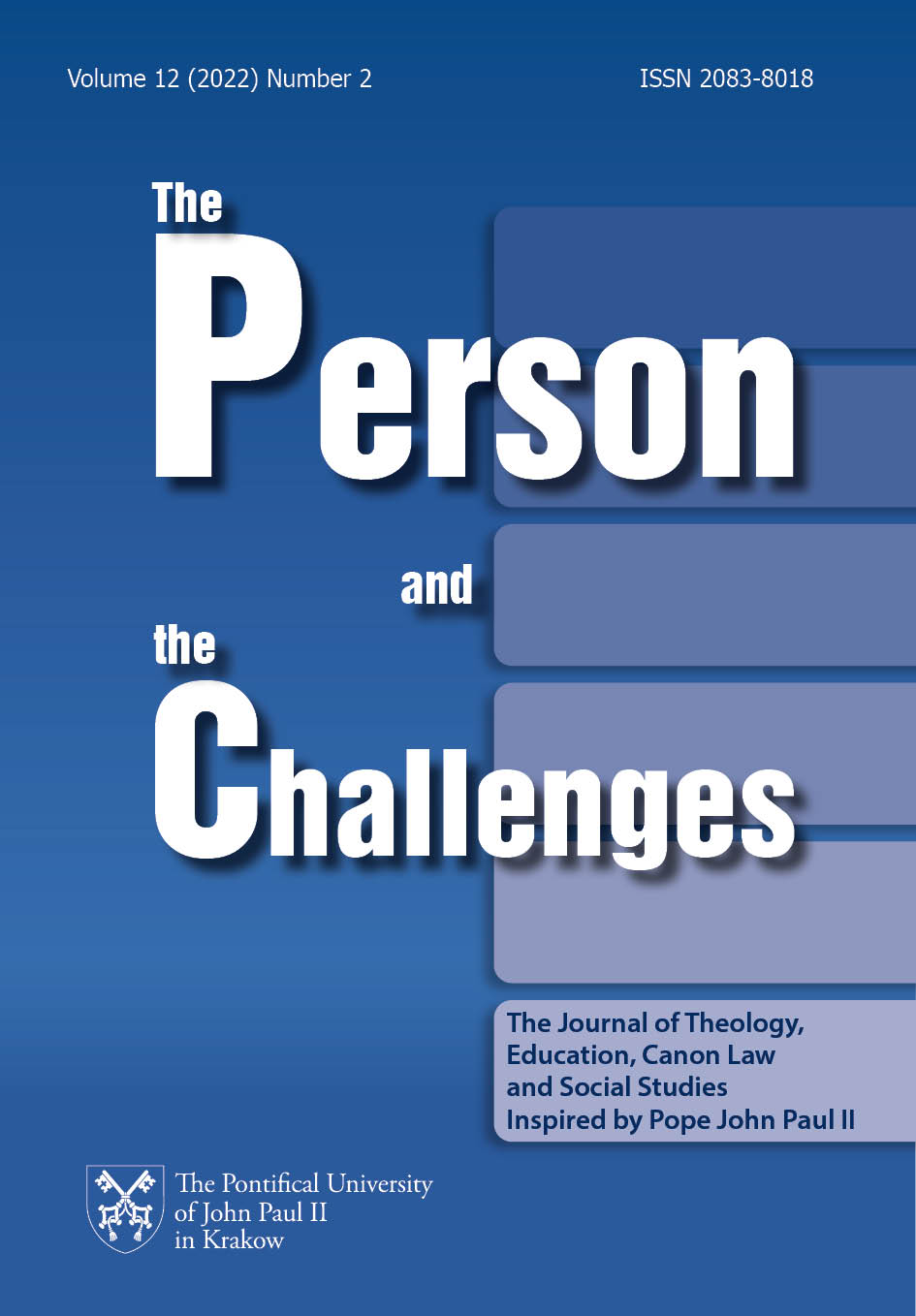Theological Axiology of Reality
DOI:
https://doi.org/10.15633/pch.12202Keywords:
Theology, epistemology, axiology, dualism, methodologyAbstract
In the present discussion of the multiplicity of sciences as against the unity of knowledge, sometimes the possibility of one super-science is advocated with a suggestion that all other scientific methods should be reduced to just one method of a one particular, usually natural science. Such reductionism often leads to disrespectful pronouncements at the address of all other sciences and their methods.
This article advocates theological foundations for a multiplicity of scientific methods. Biblical ontology introduces a series of dualities called here, for the lack of a better word, “biblical graded dualism.” It is a system of asymmetrical dualities that give substance to the idea of the hierarchy of being. In the article an axiological view of reality is deduced that should facilitate a more respectful and fruitful debate among the sciences.
References
Barfield O., Saving the Appearances, New York 1965, Harcourt, Brace & World.
Barth K., Church Dogmatics 2/2, Edinburgh 1957, T & T Clark.
Bernal J.D., The Social Function of Science, London 1939, George Routledge and Sons.
Boutroux E., Pascal, Manchester 1902, Sherratt and Hughes.
Breitbart W., God and Science: Can We Believe in Both?, in: Palliative and Supportive Care, Cambridge 2005, Cambridge University Press, 3, pp. 167–169, DOI: 10.10170S1478951505050273.
Brunner E., Truth as Encounter, Philadelphia1964, The Westminster Press.
Case-Winters A., Reconstructing a Christian Theology of Nature, Aldershot 2007, Ashgate Publishing.
Deleuze G., Seminars, https://deleuze.cla.purdue.edu/seminars/anti-oedipus-ii/lecture-02 (11.7.2022).
Feyerabend P., Against Method, London 1993, Verso.
Frazier Wall J., Andrew Carnegie, New York 1970, Oxford University Press.
Gattei S., Agassi J. (eds.), Physics and Philosophy, New York 2016, Cambridge University Press.
Geertz C., Local Knowledge, New York 1983, Basic Books.
Göcke B.P. (ed.), After Physicalism, Notre Dame 2012, University of Notre Dame Press.
Goldie P., The Emotions, Oxford 2000, Clarendon Press.
Gunton C., The One, the Three and the Many, Cambridge 2005, Cambridge University Press.
Gutting G., What Philosophers Know, Cambridge 2009, Cambridge University Press.
Haeckel E., The Riddle of the Universe, New York 1905, Harper & Brothers.
Harris S., Waking Up: A Guide to Spirituality without Religion, New York 2014, Simon & Schuster.
Heisenberg W., Physics and Philosophy, New York 1958, Harper & Brothers.
Huemer M., Ethical Intuitionism, London 2005, Palgrave Macmillan.
Huxley A., Literature and Science, New York 1963, Harper & Row.
James W., The Varieties of Religious Experience, London 2002, Routledge.
Jaspers K., The Perennial Scope of Philosophy, London 1950, Routledge & Kegan Paul.
Kaufmann W., Existentialism from Dostoyevsky to Sartre, New York 1958, Meridian Books.
Koestler A., The Ghost in the Machine, New York 1989, Arkana.
Lewis C.S., Mere Christianity, London 2009, HarperCollins Publishers.
Lewis C.S., The Abolition of Man, New York 1996, Touchstone.
Lovejoy A.O., The Revolt against Dualism, New York 1930, W.W. Norton & Co.
McGrath A., The Territories of Human Reason, Oxford 2019, Oxford University Press.
Mettrie J.O. de la, Man a Machine, Chicago 1912, The Open Court Publishing Co.
Mills J., The Unconscious Abyss, Albany 2002, State University of New York Press.
Mises L. von, Theory and History, Auburn 2007, Ludwig von Mises Institute.
Preston J., Feyerabend: Philosophy, Science and Society, Cambridge 1997, Polity Press.
Putnam H., The Collapse of the Fact/Value Dichotomy, Cambridge 2003, Harvard University Press.
Scheler M., Selected Philosophical Essays, Evanston 1973, Northwestern University Press.
Schneider K.J., Rollo May on Existential Psychotherapy, “Journal of Humanistic Psychology” 49 (3009) 4, p. 422.
Snow C.P., The Two Cultures, Cambridge 2012, Cambridge University Press.
Sokal A., Transgressing the Boundaries: Towards a Transformative Hermeneutics of Quantum Gravity, http://www.physics.nyu.edu/sokal/transgress_v2_noafterword.pdf (4.7.2022).
Swartz O., Conducting Socially Responsible Research, Thousand Oaks 1997, Sage Publications.
Szasz T., The Second Sin, New York 1973, Doubleday & Co.
Thiselton A.C., The First Epistle to the Corinthians, Grand Rapids 2000, Eerdmans.
Vitz P.C., The Psychology of Atheism, Addison 2008, Christian Leadership Ministries.
Warnock G.J., Contemporary Moral Philosophy, London 1967, Macmillan and Company.
Watson R.A., Shadow History in Philosophy, “Journal of the History of Philosophy” 31 (1993) 1, p. 105.
Zizek S., Organs without Bodies, London 2012, Routledge.
Downloads
Published
Issue
Section
License
Copyright (c) 2022 Pavel Hanes

This work is licensed under a Creative Commons Attribution 4.0 International License.
Authors who publish with this journal agree to the following terms:
- Authors retain the copyright and full publishing rights without restrictions, and grant the journal right of first publication with the work simultaneously licensed under a Creative Commons Attribution 4.0 International License that allows others to share the work with an acknowledgement of the work's authorship and initial publication in this journal.
- Authors are able to enter into separate, additional contractual arrangements for the non-exclusive distribution of the journal's published version of the work (e.g., post it to an institutional repository or publish it in a book), with an acknowledgement of its initial publication in this journal.
- Authors are permitted and encouraged to post their work online (e.g., in institutional repositories or on their website) prior to and during the submission process, as it can lead to productive exchanges, as well as earlier and greater citation of published work (See The Effect of Open Access).

